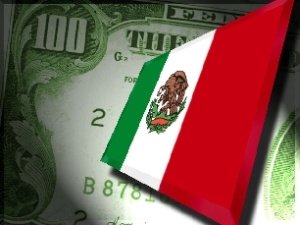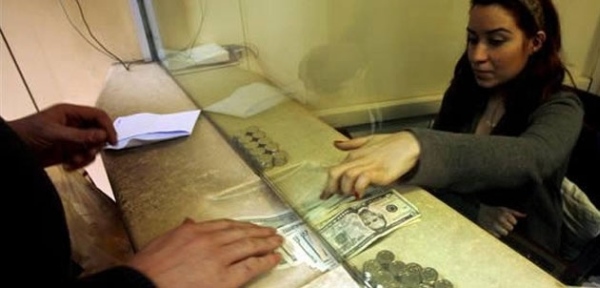Bonita Springs, Florida — Saul Ramirez Gonzalez sends the majority of his earnings to his family in Mexico City, Mexico.
On a recent rainy afternoon, the 47-year-old Bonita Springs, Florida resident bicycled to Rapid Envios, a business that cashes checks and sends money orders, to send about 70 percent of his earnings to his wife and two daughters who live in Mexico's capital city.
The US leads the world as the biggest source country for remittances. Millions of Latin Americans working in the US send home money to help their families with necessities.
At Rapid Envios, manager Beatrize Fernandez said in Spanish the majority of remittances are sent to Mexico and Guatemala.
Unlike other parts of the United States, Fernandez said, migrant workers in Southwest Florida have sent less money to their families back home this year, compared to last year. Fernandez credits the decrease to the economic downtown and migrants returning home due to tighter immigration enforcement.
The Rapid Envios in Bonita Springs transferred $232,600 to developing countries from January to September, compared to $256,815 during the same period last year — a 9 percent decrease.
Fernandez said roughly 300 remittances are sent monthly — 250 money transfers are sent to Mexico and Guatemala; about 30 percent to Colombia and the other 20 percent to Latin American countries, including Honduras, El Salvador, and the Dominican Republic.
However, The Wall Street Journal reported migrant workers abroad sent more money to their families in the developing world last year than in 2010, and they are expected to transfer even more cash home this year - despite the economic uncertainty gripping the globe.
The world's 215 million international migrants transferred about $372 billion to developing countries in 2011 compared with $332 billion in 2010, according to the World Bank. Projected remittances will reach $399 billion this year and $467 billion by 2014.
Remittances remain a key source of currency for developing countries, often outstripping foreign direct investment and foreign aid, according to a Wall Street Journal story.
A recently published World Bank book, "Migration and Remittances During the Global Financial Crisis and Beyond," said countries such as Indonesia, India, and Mexico were somewhat immunized from the global downturn by the influx of cash transfers from their nationals working abroad.
 |
Despite the weak US job market, tighter immigration enforcement, and violence at the border that have slowed migrant arrivals, central banks in Latin America reported brisk growth in remittances this year. Mexico reported a 5 percent increase — mostly from the US — to $13.7 billion for the first seven months of 2012.
The Bank of Mexico, the constitutional mandate central bank of the Mexican State, couldn't be reached for comment.
Fernandez said most migrant workers send most of their earnings back home. For example, if a worker earns $260, they send $200 to their families. "I don't know how they manage to live with $60 all week long but they do," she said in Spanish.
Inside the beige-colored building, adorned with flags of an array of countries, Fernandez warmly greets Ramirez Gonzalez, who wore ripped jeans and a white T-shirt. He sent $350, or $4,413.50 pesos, to his wife's bank account in Mexico. On that particular day, the dollar exchange rate was $12.61 pesos per dollar. The fee to transfer money to Mexico is $10.
Gonzalez, a draper and carpenter, said in Spanish that the amount of money he is sending back home has decreased from years past because he has less work. However, he manages to cut back on his personal expenses to keep sending money. He has been sending money every 15 days to his family for the past five years, estimates a decrease of 20 percent.
Gabino Tunales Perez is another of the many Latin American immigrants who typically sends money back home. Recently, he sent his parents, who live in Monterrey, Mexico, $200, or $2,522 pesos, to help them with house repairs. The dollar exchange rate on that particular day was $12.61 pesos per dollar.
The Bonita Springs resident said he manages to send his parents an average of $100 a week. "Thank God, I have always had a job and have been able to send money to my parents," Tunales Perez, a supervisor of stucco work, said. "I have been blessed."
Several miles away, at another branch of Rapid Envios in North Naples, the amount of money sent abroad also has decreased.
Manager Juan Pablo Sierra said there has been a 20 percent decrease of the amount of money being sent abroad at his business this year, compared to last year. However, Sierra said the total number of transfer transactions remains the same. He couldn't comment on the specific amount of money sent abroad.
Sierra said the majority, or 45 percent, of the money transfers are sent to Colombia; 35 percent to Mexico, and the rest to other Latin American counties, including Guatemala, El Salvador, Honduras and Bolivia, Peru, and the Dominican Republic.
The Inter-American Dialogue, a Washington-based think tank, predicts a 7 percent or 8 percent increase in remittances to Latin America and the Caribbean this year. The region received $69 billion in transfers in 2011, up from $64 billion in 2010.
In Southwest Florida, remittances can also be made at Walmart through its service MoneyGram International Inc., a global payment services company.
MoneyGram reported a 13 percent increase over last years money transfer transactions, according to its financial results for the second quarter of 2012, which ended June 30th.
MoneyGram spokeswoman Patty Sullivan said, "the number one corridor is 'within' the US and the second is US-to-Mexico. The third is 'send and receive' within the same city." The report shows an 11 percent overall growth in US outbound transaction volume on the strength of US-to-Mexico, which grew 19 percent.
Sullivan said money transfer transactions sent from the US to Mexico is the number 1 corridor in Latin America, which includes 40 countries.
MoneyGram reports a total revenue of $330.1 million, or an increase of 7 percent compared to $310 million in the second quarter of 2011. The report says there has been an 18 percent growth in other countries outside the US using the MoneyGram service to send money. Transaction volume within the United States also increased by 10 percent in the second quarter.
At Publix, a Florida-based supermarket chain, migrant workers can send money back home using Western Union.
Juan Medrano, who recently cashed his check of $300 at Rapid Envios in Bonita Springs, usually sends money back home to his family, including his mother and adult children who live in the Federal District of Mexico City, through Western Union.
However, the 50-year-old Lehigh Acres resident said in Spanish he is sending less money back home because he isn't earning the same amount as he once did as a maintenance laborer. On that particular day, he didn't plan on sending money to his family.
Southwest Florida migrants can also send money abroad through Wells Fargo. The bank does not keep track of who is a migrant worker when transfers are made. In addition, the money that is sent is proprietary information to protect the privacy of customers, Wells Fargo spokeswoman Kathy Harrison said.
Neither Bank of America nor Western Union officials could be reached for comment about remittances sent to developing countries.


